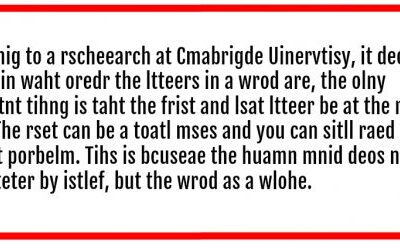A résumé is not a place where you showcase all your talents. Be picky about which skills, accomplishments, and hobbies you include based on the role you are applying for.
Preparing a copyeditor’s résumé: The basics
Screening résumé is usually an elimination process: with a quick glance, any résumé with spelling mistakes, wrong use of capitalization, messed-up margins, weird spacing, and irregular font sizing would scream for elimination – in that order. When it comes to résumé writing, these small details might disclose how much effort you put in – or did not put in.
English and its major variants
Most of us are familiar with at least two variants of the English language: North American and British. You would be surprised to know there are countless variants. A simple scroll in your ‘setting the language preference’ in MS Word will let you know the numerous variants of English extant today.
Factoring quadratic expressions and designing an online course
What could your ninth standard teacher teach about training? Here is an interesting story of how my math teacher taught me to design our online course.
Be prepared to be thrown away
What if, as a freelance editor, you are thrown away? An unresponsive author, pending payment, lack of recognition, maybe all of them! What should you do?
Can the Internet Impede the Skills of Copy Editors?
Slow and steady changes are not recognized but can result in a compromise in the core skills
Feedback: giving gracefully and receiving gratefully
Feedback in the workplace is an essential component. The openness of a disciple and the grace of a guru will make this process an excellent experience.
Feedback, the most dreaded word
Feedback hurts, brings the morale down, and even humiliates. But feedback is a mechanism that will put us on the right path and help us bring out the best in each of us.
A Copyeditor’s Guide Through Stephen King’s Tool Box
Author Stephen King’s uncle had insisted on carrying a large and heavy tool box yet the only tool that was needed to fix the problem was a screwdriver. Can you guess why? Read on!
The most underrated villain of copy editing
What is that one type of error that may go unnoticed even under otherwise careful eyes, but can be very embarrassing when noticed, both to the author and, obviously, to the one who edited the manuscript? Read on…
Books I love: Eats, Shoots & Leaves
Punctuation can get tricky especially when it comes to deciphering what the author intends to say and what strokes or dots need to be used to enhance the structure and meaning of a sentence. In Eats, Shoots & Leaves, by Lynne Truss, we discover how even the slightest of punctuation slipups can turn fatal!
Greetings on US National Grammar Day
Celebrations are a coming together of groups of people with the common goal of commemorating or valuing something. Why can’t grammar be that thing?
A Tale of Two Countries: British Vs American English
One of the first things a copyeditor would learn is about the differences between the British English and the American English. This post takes a quick look into the important differences between the two.
The Psychology of Editing
Not many would link editing and psychology. Of course, it is nearly impossible to evaluate the psychology of editors since the person sitting behind every keyboard or holding red pen can be very diverse. So, contrary to the general opinion, putting editors in a box labeled ‘nerd’ may be difficult.
Continuous Learning for Copyeditors
Without the external stimuli – which is nothing but continuous learning – the potential editor only remains that way – a potential editor, not realizing their great editing skills.
Phantasmagorically experiencing editing
Not every editor is gifted with the most important learning in his first ever project. Here I am, the gifted.
And there are myths
Recently I received a WhatsApp message, a picture message with Vivekananda, the great saint in his arms-crossed pose. Unusually, this time it was about English grammar. I was rather surprised. Many of his quotations are on meditation, Hinduism, devotion, and the like....
Spelling: Part 01, The influence on “Britain”
This post is an outcome of asking so many whys. I never fancied that I’ll start writing on the evolution of English, let alone the history of England. However, the differences between the American and British English piqued my interest and I started doing a little...
Management lessons from a “nattiya” guru
I was invited for a "Bharatha nattiya arangettram" of my friend's daughter. Five very young children – should be around 7-8 years of age – performed their maiden apprearance on the stage. Though not a connoiseur of classical dance, I could appreciate the coordination,...
it is “-er” always
Everyone aware of the US/UK variant in spellings is well aware that words ending in "-er" in US spelling end in "-re" in UK spelling. For example, "fiber" and "fibre"; "titer" and "titre". One should also remember that the converse is not always true: Not all the...















